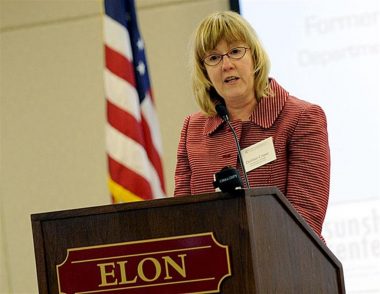The former spokeswoman for the N.C. Department of Health and Human Services, fired after an investigative newspaper series on the privatization of mental health services in the state, called this week for officials to comply with the law by keeping archives of all emails sent in the course of their work. Her remarks at Elon University came during the annual "Sunshine Week," which promotes open access to government records.

The Sunshine Center was established at Elon University in the School ofCommunications in February 2007 as the educational outreach unit of thecoalition. The N.C. Open Government Coalition states on its web site that itsmission “unites organizations interested in ensuring and enhancing thepublic’s access to government activity, records and meetings.”
The half-day conference featured discussions from reporters and attorneys, but Crane highlighted the ledger, and she outlined several steps that government agencies must take to honor the state’s public records – sometimes called “sunshine” – laws.
“Public records are public records, no matter what their form,” she said. “I viewed my job as helping to illuminate what government does.”
Crane, who was fired after the News & Observer series in Raleigh, has said that Gov. Mike Easley’s press office often told executive branch public information officers to destroy e-mails after they were sent to the governor’s office.
“One thing that I told reporters after the Governor sacked me is that while I served at the will of Mike Easley,” Crane said, “the citizens paid my salary.”
The News & Observer reported that the governor’s office legal counsel said no evidence existed that such a request was made. But initially, at least, Crane said she wants to see a change in how e-mails are handled within state government.
“With few exceptions, most materials are public record,” she said. “So rather than debating who deletes what and when, public officials should be required to maintain archives of their e-mails.”
She also said that the network or Internet service provider shouldn’t preclude public officials from releasing records. If someone is sending e-mail from Gmail, Hotmail or state e-mail accounts, it’s all open.
Crane laid out other proposals to help the sun shine on North Carolina government:
1.) There should be a state-wide policy on photocopying charges for open records. She said the number should be based on a real equation, not an arbitrary figure.
2.) There should be a clear policy on maintaining backups of PDA messages because more business is being done technologically and outside the office.
3.) The response to public records requests must be consistent and timely. Requesters should receive immediate written responses, she said. “A request shouldn’t be allowed to languish as it goes from desk to desk, looking for a home,” she said.
4.) Personnel information should be readily disclosed. If an employee is promoted, fired or given a raise, she said, the public has a right to know why. “Not every employee gets as much ink as I have,” Crane said. “In fact, my case is one of the few examples where the current administration hasn’t hidden behind the guise of ‘That’s a personnel issue, and we can’t talk about it.’ ”
Crane said she’s often reflected about why she lost her job and what she could’ve done differently to keep it. She said she regrets losing it, but she doesn’t regret anything she did.
“I loved my job and I miss it dearly,” Crane said. “I really thought I did some good. And I can truly say to you I was always honest.”
One lawyer who spoke earlier in the day to conference attendees shared his views on open records and how they prevent the abuse of power by those elected to office.
“It doesn’t take some people long to think they’re a king instead of an elected public servant,” said Mark Prak, a media attorney for Brooks Pierce. “It is the duty of the press to try to ferret out wrongdoing.”


